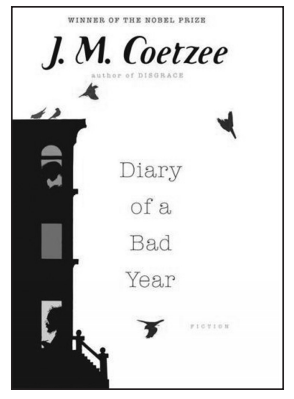Book Review: Diary of a Bad Year
 How free is democracy? How do raids perpetuate apartheid? Is economic competition the result of an innate human viciousness? The answers to these and other political questions, framed as a series of short essays, allow J.M. Coetzee to expose the fragility and incoherence of strong political opinions in his latest novel, Diary of a Bad Year.
In the age of the Internet, when anyone can publish an opinion, it has become increasingly necessary to shout more loudly and write more heatedly in order to get people to listen. “We have all got opinions, especially about politics. If you tell a story at least people will shut up and listen to you,” muses Anya, one of the book’s three main characters. What, then, are the implications when opinions are structured as stories, when fiction suggests a certain level of untruth, of manipulation, even deception? Coetzee’s characters and formal techniques reveal how the narrative quality of opinions can cause them to fail at a political level while remaining valuable on a personal one.
How free is democracy? How do raids perpetuate apartheid? Is economic competition the result of an innate human viciousness? The answers to these and other political questions, framed as a series of short essays, allow J.M. Coetzee to expose the fragility and incoherence of strong political opinions in his latest novel, Diary of a Bad Year.
In the age of the Internet, when anyone can publish an opinion, it has become increasingly necessary to shout more loudly and write more heatedly in order to get people to listen. “We have all got opinions, especially about politics. If you tell a story at least people will shut up and listen to you,” muses Anya, one of the book’s three main characters. What, then, are the implications when opinions are structured as stories, when fiction suggests a certain level of untruth, of manipulation, even deception? Coetzee’s characters and formal techniques reveal how the narrative quality of opinions can cause them to fail at a political level while remaining valuable on a personal one.
The essays contained in the first half of Diary of a Bad Year revolve around a central question: what is the point of political action? The pieces express the opinions of Señor C, a respected, reclusive Australian writer whom it is tempting to associate with Coetzee himself. He has been selected to contribute to “Strong Opinions,” a book of grandiose pronouncements on politics and the nature of the state, whose subjects range from anarchism to Machiavelli to asylum in Australia. But while Señor C writes his resolute opinions, Anya, a beautiful Filipina fantasy hired to type up the manuscript, strolls into his life and laundry room. It is Señor C’s obsession with Anya that forms the plot and emotional core of the novel.
The book’s pages are divided into thirds: the top part contains Señor C’s essays, while Señor C and Anya’s monologue form the lower sections. The sections are linked thematically, but this structure lends itself to a broken, uneasy read. This format opens up the lived life behind Señor C’s opinions, complicating them and perhaps undermining their strength.
Coetzee also splices in commentary from a third character, Alan—Anya’s arrogant investment consultant lover. Alan’s criticism focuses on exposing Señor C’s opinions as stories. Alan sees opinions as outdated, accuses Señor C of being a dreamer and a schemer, and even argues that the writer’s opinions are intentionally deceptive. He claims that, in the market economy of the modern world, opinions on “good and evil” don’t matter. He makes a case for the ineffectiveness of Señor C’s opinions in the realm of the state and the economy. Alan lectures Anya, “Your Señor C’s problem is that he can’t think structurally. Everywhere he looks he wants to see personal motives at work. He wants to see cruelty. He wants to see greed and exploitation. It is all a morality play to him, good versus evil. What he fails to see or refuses to see is that individuals are players in a structure that transcends individual motives, transcends good and evil... [T]he market, if you like, which is beyond good and evil, like Nietzsche said. Good or evil motives, they are just motives in the end, vectors of the matrix, that get evened out in the long run.”
The second half of Diary of a Bad Year contains Senor C’s “Soft Opinions.” Not intended for publication, they are much more diary-like than the “Strong Opinions,” with pieces on birds and fire and old age that ultimately chronicle his descent into dementia. The new essays lack the conviction and coherent worldview of the earlier ones. Instead, it is Anya’s voice—originally uninformed and apathetic, now practical, compassionate, and authoritative—that takes over the two commentary portions of the page. “There is the individual dimension,” she writes, “and then there is the bigger picture. A lie in the individual dimension does not necessarily count as a lie in the bigger picture. It can transcend its origins ... It’s like makeup. Makeup may be a lie, but not if everyone wears it. If everyone wears makeup, makeup becomes the way things are, and what is the truth but the way things are?” Of course, the formal features of Coetzee’s novel muddle the identification of the lies —are they the earlier essays, out of joint with Señor C’s life? Are they the commentaries?
With Señor C’s old age, the power in his and Anya’s relationship shifts to her. She, changed by their friendship and by her intimate understanding of his mind, defends him and his writings against Alan, and is willing to hold his hand in his final days. In the end, Señor C’s opinions, while failing to save the world, may ultimately have saved him.
